MercoPress. South Atlantic News Agency
Tag: Cuba
-
Wednesday, December 11th 2019 - 11:32 UTC
Charges against Evo Morales filed before ICC, law firm announces
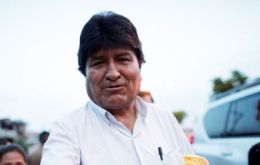
Charges for crimes against humanity against former Bolivian President Evo Morales have been filed by November 30 last before The International Criminal Court (ICC) at The Hague, a Paris-based law firm confirmed on Tuesday.
-
Friday, November 29th 2019 - 08:51 UTC
EU condemns Cuba for detention of leading dissident Jose Daniel Ferrer

The European parliament joined the United States on Thursday in condemning Cuba's detention and reported mistreatment of leading dissident Jose Daniel Ferrer, whom the Communist government in Havana calls a US-backed counter-revolutionary.
-
Monday, November 18th 2019 - 09:50 UTC
Bolivian interim government cuts relations with Venezuela and orders Cuban medical teams out of the country
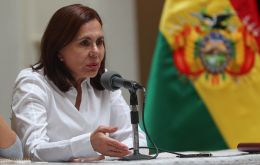
Bolivia's interim leadership says it has broken diplomatic ties with the Government of Venezuelan President Nicolás Maduro and ordered Cuban medical teams to leave Bolivia.
-
Friday, November 8th 2019 - 09:22 UTC
UN Assembly condemns “anachronistic” and “inhumane” US embargo on Cuba
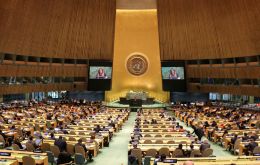
The UN General Assembly condemned the nearly 60-year-old US embargo on Cuba on Thursday for the 28th year in a row, calling for an end to it by a vote of 187 to three. Only Israel and Brazil voted with the US against the resolution. Two other US allies -Ukraine and Colombia - abstained.
-
Saturday, October 26th 2019 - 09:50 UTC
US suspends all scheduled flights to Cuba except those to Havana

The United States will suspend all scheduled flights to Cuba except to its capital Havana, authorities said on Friday, as US President Donald Trump pushes to dismantle the rapprochement begun by his predecessor Barack Obama.
-
Thursday, October 17th 2019 - 09:19 UTC
Spanish King will visit Cuba as part of Havana's 500th anniversary
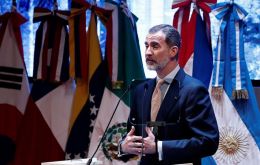
Spain's King Felipe VI will visit Cuba next month as part of the 500th anniversary celebrations of the island nation's capital Havana, the European country's Foreign Minister Josep Borrell said on Wednesday. “I can confirm it will take place in November” after the Spanish general elections on November 10, Borrell said during a visit to Havana where he met his Cuban counterpart Bruno Rodriguez.
-
Monday, October 7th 2019 - 09:40 UTC
Russia pledges to help Cuba have access to oil and petroleum products

Russia will find ways to help Cuba get oil and petroleum products, Russian Prime Minister Dmitry Medvedev said in an interview broadcast on Saturday. Medvedev pledged to help develop Cuba’s energy sector during a visit to the island this week but did not announce any short-term measures to provide relief from crippling fuel shortages in the wake of tougher U.S. sanctions.
-
Tuesday, September 24th 2019 - 09:50 UTC
Bachelet feels sorry for Brazil, “how I take things, depends on who is saying them...”
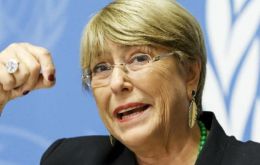
U.N. human rights chief Michelle Bachelet, who earlier this month came under personal attack from Brazilian president Jair Bolsonaro, says she feels sorry for Brazil, according to a Chilean media report published on Sunday.
-
Friday, September 20th 2019 - 12:24 UTC
United States expels two members of Cuba's diplomatic mission to the UN
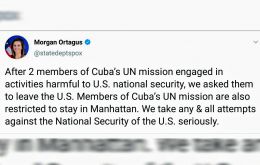
The government of the United States has expelled two members of Cuba's permanent mission to the United Nations due to their alleged involvement in “activities harmful to US national security,” according to State Department spokeswoman Morgan Ortagus' posting Thursday on Twitter.
-
Friday, September 20th 2019 - 09:35 UTC
Probable cause for strange symptoms among US, Canadian diplomats in Cuba found
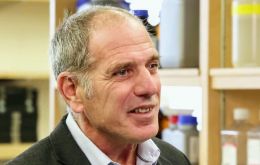
Dalhousie University and Nova Scotia Health Authority scientists Thursday claimed to have discovered the cause of strange symptoms found in recent years among US and Canadian diplomats in Havana, it was reported Thursday.
